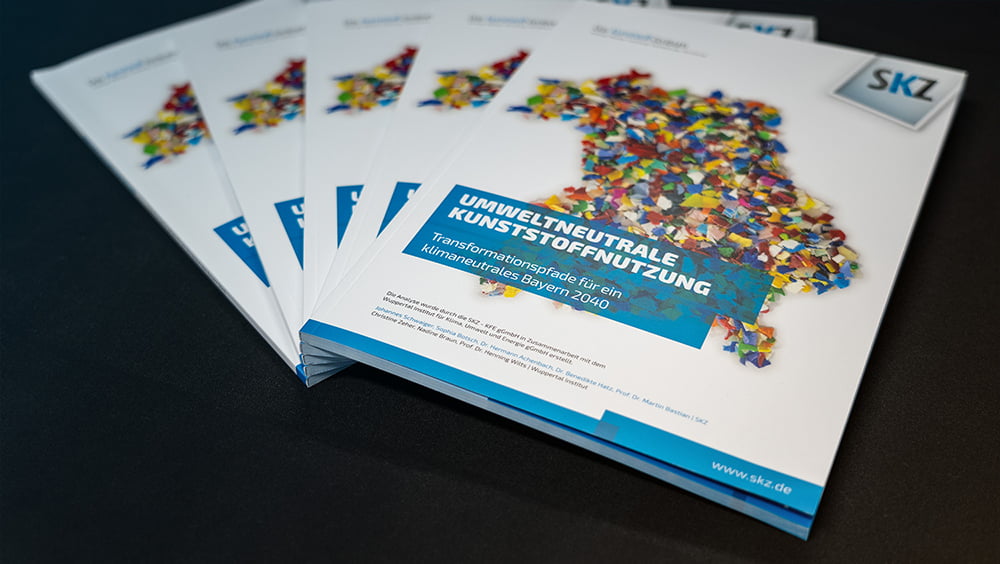Sustainable transformation of the Bavarian plastics industry
The Bavarian plastics industry is facing major challenges on its way to a circular economy and climate neutrality. In a recent analysis entitled "Environmentally Neutral Plastics Use - Transformation Paths for a Climate Neutral Bavaria 2040", the SKZ Plastics Center, in cooperation with the Wuppertal Institute, shows which measures and technological innovations are required and how the environmental impact of plastics use can be reduced. The work was made possible by funding from the CSU parliamentary group initiative.

Together with the Wuppertal Institute, the SKZ has published the analysis "Environmentally neutral use of plastics - transformation paths for a climate-neutral Bavaria 2040". (Photo: Luca Hoffmannbeck, SKZ)
Free State of Bavaria to become carbon neutral by 2040 - SKZ's latest analysis shows what needs to be done
With around 600 companies and an annual turnover of around 20.8 billion euros, the Bavarian plastics industry is an important economic factor. Increasing requirements, including those resulting from the regulatory developments of the EU Green Deal, are already exerting great pressure on the plastics industry to change: These include, for example, the expected recycling quotas for certain plastic applications and polymers, the ban on disposable products, and the requirements for the durability and reparability of products as part of the upcoming EU Ecodesign Regulation. In addition, the Free State of Bavaria wants to be the first German state to become climate neutral by 2040 - which makes a suitable climate strategy and climate management indispensable for companies in the plastics industry.
Three greenhouse gas scenarios developed
In the analysis, a climate impact indicator (KI) of approximately 8.7 million tons of CO₂ equivalent (CO₂e) was determined for the production and recycling of plastics used in Bavaria in 2021. Three greenhouse gas scenarios were developed for the year 2040. Scenario 1 is based on existing policy requirements, Scenario 2 shows the greenhouse gas reduction potential if existing technology trends are largely exploited, and Scenario 3 represents a best-case scenario that assumes in particular a greater avoidance of the use of plastics, also due to other usage patterns. Depending on the scenario, greenhouse gas emissions can be reduced to between 5.5 million tons of CO₂e (scenario 1) and 2.1 million tons of CO₂e (scenario 3) by 2040.
Technical infrastructure in Bavaria must be expanded
In order to reduce the overall environmental impact of plastics, and in particular the greenhouse effect, increased development efforts are required, especially for material reduction, substitution of virgin plastics and targeted recycling of plastic waste. To this end, the technical infrastructure and support services of the R&D facilities in Bavaria must be further expanded in order to provide Bavarian companies with targeted support for the transformation.
Long-term competitiveness of recyclates must be established
The EU Ecodesign Regulation, which is currently in preparation, must provide binding specifications for the use of materials, repairability, durability and recyclability of plastics. In the area of sorting and recycling infrastructure, various tracer technologies and AI-based detection and sorting systems are in the starting blocks. Extensive development programs should be set up for their industrial testing. To create investment security for sorting and recycling facilities, the long-term competitiveness of recyclates must be established. Business models for take-back and collection systems need to be developed and tested in order to manage end-of-life material flows as effectively as possible.
Use of bio-based plastics is generally ecologically beneficial
The use of bio-based plastics and the use of renewable resources in combination with plastics is also generally ecologically beneficial. In line with the Bavarian bio-economy strategy, model regions should be promoted that cover the entire value chain of raw material supply and product manufacture of bio-based plastics and composites and demonstrate their technical and economic viability.
Ongoing sustainability monitoring recommended
Continuous sustainability monitoring of the Bavarian plastics industry is recommended in order to check the effectiveness of the measures and technical developments introduced. Only in this way can the environmental consequences of rebound effects and progressive economic growth be taken into account.
Read the full study
More information on sustainability and circular economy at the SKZ
More information on Wuppertal Institute


